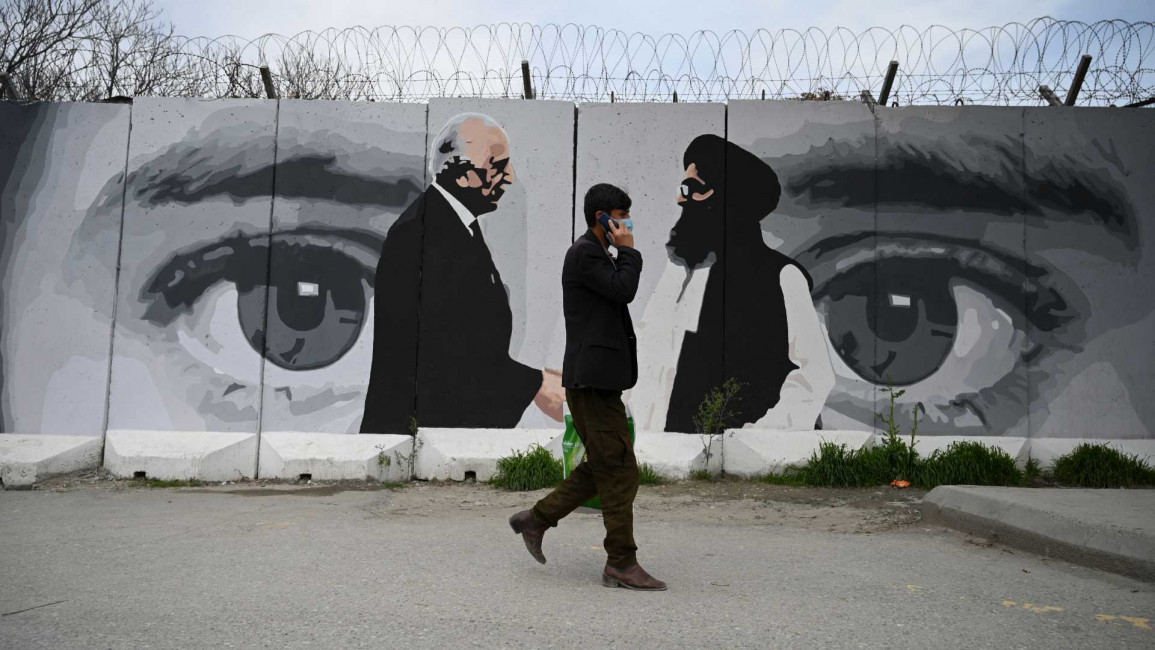Thousands of Afghans flee 'coronavirus epicentre' Iran, prompting fears of catastrophic outbreak
Thousands of Afghans flee 'coronavirus epicentre' Iran, prompting fears of catastrophic outbreak
Afghans working and studying in Iran have flooded back across the border due to the coronavirus pandemic.
3 min read
More than 145,000 Afghans left Iran in March this year [AFP]
Nearly 150,000 Afghans fled Iran last month amid the coronavirus pandemic, threatening to trigger a catastrophic outbreak in neighbouring Afghanistan.
The Islamic Republic has emerged as the regional epicentre of the pandemic where more than 3,600 people have died from Covid-19, the highly contagious respiratory disease caused by the novel coronavirus.
An influx of unchecked returnees from Iran to Afghanistan threatens to overwhelm the country's battered healthcare system, wracked by decades of war, the Associated Press reported.
More than 198,000 Afghans have returned from Iran so far this year, according to the International Organisation of Migration (IOM).
More than 145,000 of those returnees fled the Islamic Republic in March alone as the outbreak in Iran accelerated.
At the height of the influx, around 15,000 people a day were crossing the border, according to Afghan Repatriation and Returnees Minister Sayed Hussain Alimi.
Although the number of returnees has since gone down, Afghan officials are worried Iran will force out another one million citizens working illegally in the Islamic Republic.
Those who have returned from Iran have travelled into Afghanistan untested and unmonitored, and the full extent of the virus' spread in the war-torn country is not yet known.
Neither the Afghan government nor independent agencies operating at the border, such as the IOM, have the capacity to test, take temperatures or quarantine returnees.
Read more: Afghanistan: Asia's next coronavirus epicentre?
Health Minister Ferozudin Feroz said returnees from Iran had prompted the spread of the virus so far.
Authorities have reported 273 confirmed Covid-19 cases, more than 210 of them in returnees from Iran. Four deaths from the virus have been recorded.
"If the cases increase, then it will be out of control and we will need help," Feroz told the AP.
One worker described his experience returning to his home country from Iran.
Mahdi Noori, who quit school at 15 to go and work in Iran, had most recently been working in a factory in the central city of Isfahan, earning around $180 a month to send back to his impoverished family of eight.
When the factory shut amid the outbreak, he lost his income and feared he would get no treatment in the Islamic Republic if he contracted the virus. He attempted to get tested in Iran but was refused, he told the AP.
Noori travelled to the Iranian-Afghan border and then across nearly the whole breadth of the country to reach the capital, Kabul.
He said he was met with hostility from his fellow countrymen, who told him: "Fear of coronavirus brought you home to kill others with it."
After returning home, Noori isolated himself for two weeks from his family, fearing he could infect them.
Another returnee told the AP he had also quarantined himself upon his return to Afghanistan.
"This virus is like the wind," said Habibullah Zafari, a student who was unable to get tested in Kabul. "You do not know where it comes from and how you get infected."
Afghanistan imposed a lockdown in Kabul and Herat province, which neighbours Iran, on 28 March.
The government's response has been hobbled by continuing violence and a political crisis, with two candidates claiming to have won recent presidential elections.
Follow us on Facebook, Twitter and Instagram to stay connected
The Islamic Republic has emerged as the regional epicentre of the pandemic where more than 3,600 people have died from Covid-19, the highly contagious respiratory disease caused by the novel coronavirus.
An influx of unchecked returnees from Iran to Afghanistan threatens to overwhelm the country's battered healthcare system, wracked by decades of war, the Associated Press reported.
More than 198,000 Afghans have returned from Iran so far this year, according to the International Organisation of Migration (IOM).
More than 145,000 of those returnees fled the Islamic Republic in March alone as the outbreak in Iran accelerated.
At the height of the influx, around 15,000 people a day were crossing the border, according to Afghan Repatriation and Returnees Minister Sayed Hussain Alimi.
Although the number of returnees has since gone down, Afghan officials are worried Iran will force out another one million citizens working illegally in the Islamic Republic.
Those who have returned from Iran have travelled into Afghanistan untested and unmonitored, and the full extent of the virus' spread in the war-torn country is not yet known.
Neither the Afghan government nor independent agencies operating at the border, such as the IOM, have the capacity to test, take temperatures or quarantine returnees.
Read more: Afghanistan: Asia's next coronavirus epicentre?
Health Minister Ferozudin Feroz said returnees from Iran had prompted the spread of the virus so far.
Authorities have reported 273 confirmed Covid-19 cases, more than 210 of them in returnees from Iran. Four deaths from the virus have been recorded.
 |
| [Click to enlarge] |
"If the cases increase, then it will be out of control and we will need help," Feroz told the AP.
One worker described his experience returning to his home country from Iran.
Mahdi Noori, who quit school at 15 to go and work in Iran, had most recently been working in a factory in the central city of Isfahan, earning around $180 a month to send back to his impoverished family of eight.
When the factory shut amid the outbreak, he lost his income and feared he would get no treatment in the Islamic Republic if he contracted the virus. He attempted to get tested in Iran but was refused, he told the AP.
Noori travelled to the Iranian-Afghan border and then across nearly the whole breadth of the country to reach the capital, Kabul.
He said he was met with hostility from his fellow countrymen, who told him: "Fear of coronavirus brought you home to kill others with it."
After returning home, Noori isolated himself for two weeks from his family, fearing he could infect them.
Another returnee told the AP he had also quarantined himself upon his return to Afghanistan.
"This virus is like the wind," said Habibullah Zafari, a student who was unable to get tested in Kabul. "You do not know where it comes from and how you get infected."
Afghanistan imposed a lockdown in Kabul and Herat province, which neighbours Iran, on 28 March.
The government's response has been hobbled by continuing violence and a political crisis, with two candidates claiming to have won recent presidential elections.
Follow us on Facebook, Twitter and Instagram to stay connected



